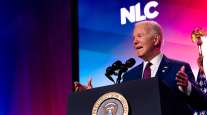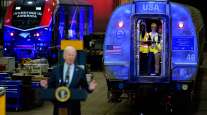Obama Proposes $50 Billion as Part of Infrastructure Plan
This story appears in the Sept. 13 print edition of Transport Topics.
President Obama proposed a transportation infrastructure plan last week, including a call for a one-time $50 billion federal investment and the creation of an infrastructure bank.
Besides the infrastructure plan, Obama last week also called for a series of tax incentives and tax cuts aimed at boosting job creation in the face of high unemployment.
In a Sept. 6 speech in Milwaukee, Obama outlined what he called “a new plan for rebuilding and modernizing America’s roads and rails and runways for the long term.”
Obama said his plan would “rebuild 150,000 miles of our roads — that’s enough to circle the world six times. That’s a lot of road.
“We’re going to lay and maintain 4,000 miles of our railways — enough to stretch coast to coast. We’re going to restore 150 miles of runways” in six years, he added.
The plan, according to the White House, calls for $50 billion to immediately fund programs and creation of a long-term framework for future transportation investment.
Obama said it “will be fully paid for,” and will cut bureaucracy, “reform a haphazard, patchwork way of doing business” and set up an infrastructure bank to fund large projects.
An aide to Rep. James Oberstar (D-Minn.), chairman of the Transportation and Infrastructure Committee, said the announcement is the first step toward a long-term highway bill.
“We knew that they were working on their proposal for the surface authorization, and this is it,” said committee spokesman Jim Berard.
Berard said there still were questions about the path forward, including the size of a new highway reauthorization bill and how to fund it beyond the $50 billion Obama outlined. He said such details are “going to be developed over the coming months.”
Oberstar said in a statement that the “principles outlined by the president are consistent with those put forward by the committee” in the draft legislation he introduced last year.
Several transportation groups said they were pleased with the proposal, but they were continuing to push for more details and a full highway bill.
American Trucking Associations was “pleased that the Obama administration has recognized the economic benefits of transportation investments and has agreed to support an immediate boost in funding for critical needs,” spokesman Brandon Borgna said.
Borgna added that the country “will also greatly benefit from a comprehensive, multi-year transportation investment approach focused on creating jobs and improving supply-chain efficiency.”
John Horsley, executive director of the American Association of State Highway and Transportation Officials, said state departments of transportation were “highly supportive” of Obama’s proposal. “If Congress wants to pass legislation investing in our transportation infrastructure, the states stand ready to put those dollars to work.”
Pete Ruane, CEO of the American Road & Transportation Builders Association, said that passage of long-term bills was “essential” and “accordingly, the $50 billion investment proposed by President Obama must be part of a long-term reauthorization bill and not a stand-alone measure.”
Besides the infrastructure package, Obama outlined a series of tax cuts and incentives for businesses and consumers.
“I’m proposing a more generous, permanent extension of the tax credit that goes to companies for all the research and innovation they do right here in Ohio, right here in the United States of America,” Obama said. He proposed extending the research and development tax credit for companies, and a one-year expensing of capital spending.
In a Sept. 8 speech in Parma, Ohio, Obama said, “I’m proposing that all American businesses should be allowed to write off all the investment they do in 2011. . . . This will help small businesses upgrade their plants and equipment, and will encourage large corporations to get off the sidelines and start putting their profits to work.”
ATA Chief Economist Bob Costello said that the investment write-off could be beneficial to trucking.
“Obviously, when we build things in this country, manufacture things or buy stuff, that’s going to have a nice impact on trucking,” he said. “That’s all positive, no matter how you get there.”
Despite the support from outside groups, the proposals face an uncertain future on Capitol Hill.
Rep. John Mica (R-Fla.), top-ranking Republican on the transportation committee, said he would not support “another tax-and-spend proposal while billions of transportation and infrastructure funds sit idle.”
In the Senate, even some Democrats expressed doubts about the infrastructure plan.
Sen. Michael Bennet (D-Colo.), who is up for election this year, stated that he “will not support additional spending in a second stimulus package. Any new transportation initiatives can be funded through the Recovery Act, which still contains unused funds.”




